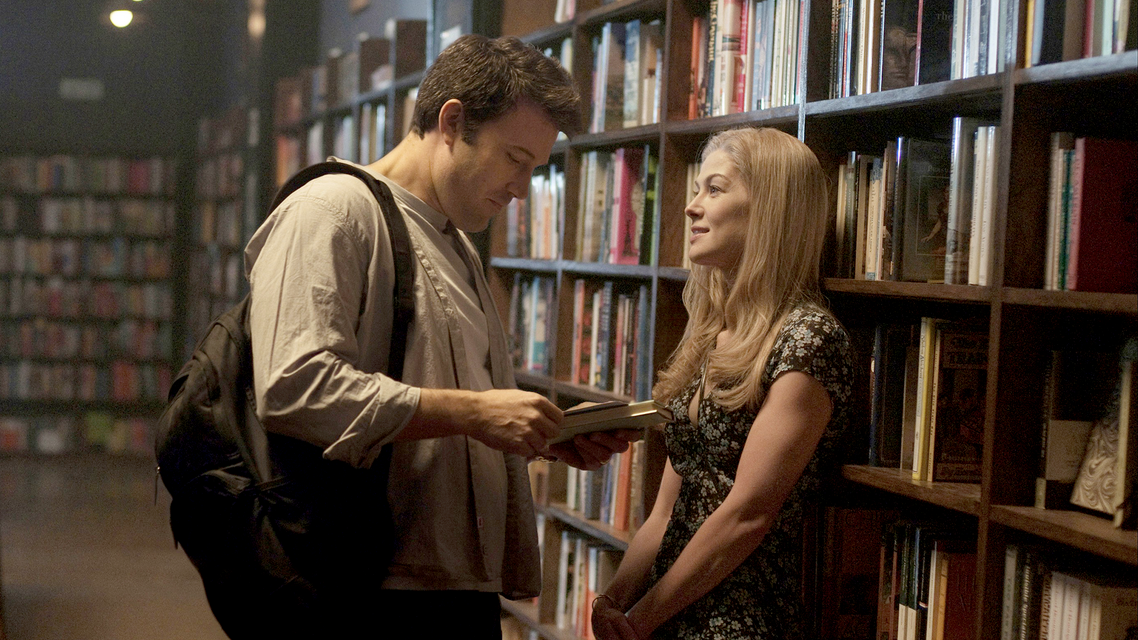Warning: Major spoilers for “Gone Girl” ahead.
In the opening moments of David Fincher’s domestic-union-gone-bad thriller Gone Girl, Nick Dunne (a seemingly vulnerable and sympathetic Ben Affleck) voices a desire to “crack a skull open.” The skull in question belongs to his wife Amy (superbly played by Rosamund Pike), a slick-haired, gorgeous blonde who’s, on the surface, perfect in every way and is bound to be gone soon enough, as the title portends. But there’s a deeper meaning to Nick’s thoughts: Rather than literally wanting to crack Amy’s skull open, what he truly craves is the ability to thoroughly read Amy, and to ask her a multitude of relationship questions, as clichéd as his extramarital affair with a younger, friskier woman. “What have we done to each other?” he wonders, not realizing that the Amy he married might not have been real, that she may have been a wish-fulfillment fantasy for him all along. We come to understand that Amy, with her acquired and escalated yearning to fit in, learned to disguise her psychopathic identity under a “cool girl” image so expertly that she has forgotten what her true self is. Gone Girl—adapted for the screen by Gillian Flynn, who wrote the best-selling novel of the same name—is a rich film for many reasons, but chief among them is the revelatory way it explores the twisted mind of its ferocious central female villain.
Gone Girl starts off as a mystery-thriller with Amy disappearing, leaving Nick as the prime suspect, but soon enough patiently transforms into a terrifying take on, and satire of, both media-obsessed American culture and of contemporary marriage reigned by mutual resentment. Most of all, it becomes a demanding, multi-layered tale, with twists and turns all deeply rooted in gender politics and a female’s shifting place in American society. Gone Girl—as conveyed through Fincher’s direction, Flynn’s script, and Pike’s performance—is an extreme, terrorizing, almost microcosmically dystopian picture of a female breaking down and striking back, retaliating against a lifetime hijacked by impossible standards set by her parents, friends, spouse, media, and the public, all of whom demand the same thing from her: perfection. “You are Amazing Amy,” her parents tell her growing up, having created a successful book series of that name inspired by her. The grander insinuation here, engendered by tabloids and society at large, is that as long as she strives to appear perfect and give people what they want, she’s golden. If we read between the lines of this film, we could discern that Amy learns this philosophy, lives and swears by it—and is driven to insanity as a result.
Her behavior in the wake of her going off the deep end led to cries of misogyny after its recent world premiere at the New York Film Festival, with many claiming that Amy is merely another stock “psycho bitch” character. That, of course, assumes that any work of fiction is automatically misogynistic if it features female characters acting in morally problematic, if not flat-out appalling, ways—as if men weren’t capable of being just as villainous. The truth, as always, is a lot more complex; so is Amy Dunne, and so is the film as a whole. In an interview Flynn gave to The Guardian back in May 2013 about Gone Girl, her response to such accusations was that it’s inspired by a limited view of what feminism is: “Is it really only girl power, and you-go-girl, and empower yourself, and be the best you can be? For me, it’s also the ability to have women who are bad characters … the one thing that really frustrates me is this idea that women are innately good, innately nurturing…There’s still a big pushback against the idea that women can be just pragmatically evil, bad and selfish.”
Amy certainly embodies all those negative characteristics in ways that are truly sui generis among fictional female antagonists. Unlike Lisbeth Salander, the heroine of Fincher’s last film, The Girl With the Dragon Tattoo, Amy is too emotionally damaged to be able to simply rely on smarts, intuition, honesty and logic the way Salander does in trying to salvage her identity. Armed with intelligence, beauty, and sexuality, Amy willingly trades honesty for manipulation, knowingly controlling the likes of those who’ve controlled her all her life to make her “missing” cover story plausible. And she doesn’t end up self-destructing either, a la Alex Forrest in Fatal Attraction or classic-Hollywood film-noir femme fatales like Kathie in Out of the Past or Debby in The Big Heat.
But the complexity of the film’s vision of this character arises from Fincher and Flynn’s deliberate lack of interest in offering easy justifications for her behavior. In Gone Girl, we always grasp her underlying motivations—her domestic disenchantment, her oppression at the hands of societal standards—even as we stand in terrified awe of her actions. This empathetic ambivalence is perhaps most evident in Amy’s fabrication of rape to falsely frame a series of ex-boyfriends, especially the supremely rich Desi Collings (Neil Patrick Harris), who she is forced to resort to after running away from being conned by two lowlifes who steal all her money. As exploitative as that act may be, once you see Desi insist that she put on decent clothes, dye her hair and “look like [her]self again,” you can halfway understand why she lashes out in the first place, refusing to be molded into another man’s image again. Once you see the real Amy as the antithesis of the approved/expected/desired female, the picture changes sharply, creating more troubling questions than pat answers, especially when it comes to the perilously thin line separating a rebellious feminist act from a deranged one.
One moment suffices in summing up the film’s ambivalent view of Amy and her appalling behavior. It comes at the “twist,” the moment when Gone Girl shifts from mystery to thriller. We’re introduced to Amy as “villain,” driving away in unattractive, loose-fitting clothes with unkempt hair swept in the wind, voraciously wolfing down a giant greasy sandwich. This look is supposed to be her disguise—but ironically, she looks more relaxed, more herself, than ever before. It’s an image that is at once frightening and liberating. While her parents desperately launch a Find Amazing Amy campaign, Amy drives away, leaving the bogus amazing behind in exchange for her freedom, however ephemeral it may be.



















4 thoughts on “The Liberating, Evil Feminism of Gone Girl”
Awesome article.
Hey, thanks Squasher!
Pingback: Gone Girl, Film Noir, and a New Femme Fatale | If I Had An Orchard
Pingback: BOOK REVIEW: ‘Gone Girl’ – Gillian Flynn | cookiedoughnut